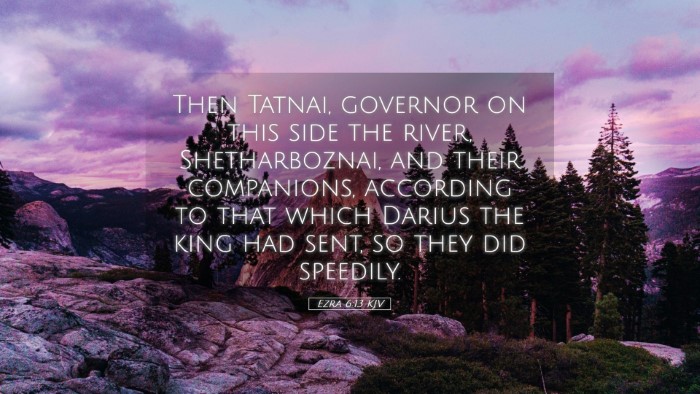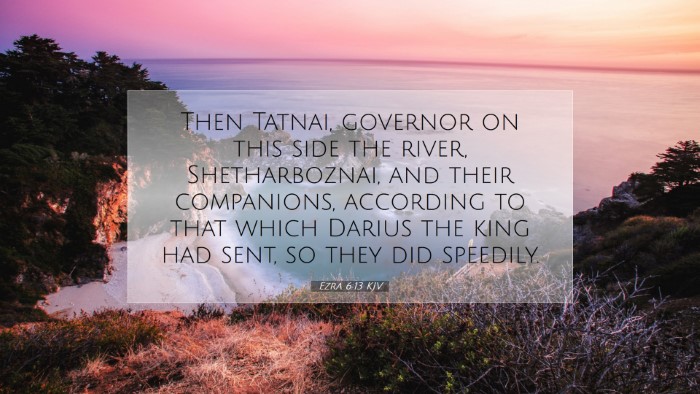Old Testament
Genesis Exodus Leviticus Numbers Deuteronomy Joshua Judges Ruth 1 Samuel 2 Samuel 1 Kings 2 Kings 1 Chronicles 2 Chronicles Ezra Nehemiah Esther Job Psalms Proverbs Ecclesiastes Song of Solomon Isaiah Jeremiah Lamentations Ezekiel Daniel Hosea Joel Amos Obadiah Jonah Micah Nahum Habakkuk Zephaniah Haggai Zechariah MalachiEzra 6:13
Ezra 6:13 KJV
Then Tatnai, governor on this side the river, Shetharboznai, and their companions, according to that which Darius the king had sent, so they did speedily.
Ezra 6:13 Bible Commentary
Commentary on Ezra 6:13
Verse: Ezra 6:13 - "Then Tattenai, governor of the region beyond the River, Shethar-bozenai and their companions diligently did according to what Darius the king had sent."
Introduction
The verse under examination, Ezra 6:13, encapsulates a moment of pivotal importance in the narrative of the return from exile and the rebuilding of the Jerusalem temple. This commentary will weave together insights from several public domain commentaries, offering valuable perspectives for pastors, students, theologians, and Bible scholars.
Contextual Analysis
Ezra 6:13 is situated within the broader context of the post-exilic community’s efforts to restore both their covenantal identity and their physical place of worship. After returning from Babylon, the Jews faced significant opposition, and the decree from King Darius represents a critical turning point in their endeavors.
Political Dynamics
Tattenai, serving as the governor of the region beyond the River, acted as a vital figure in the administration of the Persian Empire. His prompt response to the decree of King Darius indicates a sense of obligation towards maintaining the imperial directives.
- Matthew Henry's Commentary: Henry emphasizes how the authorities respected Darius' command and the importance of following through with the king’s orders as a reflection of divine providence guiding the affairs of nations.
- Albert Barnes' Notes: Barnes points out that the governor and his colleagues recognizing the legitimacy of Darius’ decree underscores the interplay of divine and earthly governance, where God’s will is realized through human actions.
- Adam Clarke's Commentary: Clarke notes the importance of this obedience as it illustrates the striking shift from opposition to support, which was essential for the rebuilding project.
Theological Reflections
This passage offers much for theological reflection, particularly regarding the nature of authority and obedience. The Jews, though liberated from exile, still operated within the framework of a foreign empire, necessitating a respectful relationship with the governing powers.
- God’s Sovereignty: The overarching theme is the sovereignty of God in the affairs of humanity. Despite the obstacles faced by the returned exiles, the divine hand orchestrated the changes in authority that allowed the rebuilding to continue.
- Human Agency: The role of Tattenai and his companions also reflects the significant part that human agency plays within the divine plan. The Persian officials were instruments through which God worked.
Practical/Application Insights
For contemporary believers and leaders, Ezra 6:13 serves as a reminder of the importance of cooperation with governing authorities and an encouragement to faithfully follow God’s commands, even amidst opposition.
- Leadership Principles: The diligence shown by Tattenai and his peers serves as an example of how leaders should execute their responsibilities with integrity and commitment to the greater good.
- Community and Cooperation: The necessity of collaborative efforts in the community of faith is emphasized. Just as the Jews needed support from their leaders, modern congregations also require unity and mutual encouragement to fulfill their God-given missions.
Conclusion
In summary, Ezra 6:13 is more than just a historical note; it is a profound commentary on authority, divine providence, and the faithfulness of God’s people in their pursuits. The dedication shown by Tattenai and his associates in executing Darius' command showcases the work of God in both visible and invisible ways. For pastors and scholars, this verse can fuel discussions on the interplay of faith and governance, the nuances of leadership, and the assurance that God remains sovereign over the affairs of men.


